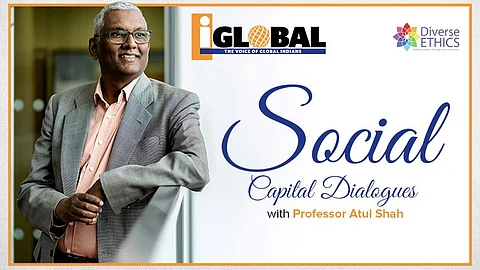

In Europe and North America, there are many comforts and luxuries even in the midst of war. We seem to have become numbed to Ukraine, just as we are numbed to climate change and even rising global inequality. Numbing is also a way of coping.
However, many eminent writers and scholars like Nuriel Roubini or Adam Tooze are saying that these are exceptional times, with a variety of global stresses coming together – economic, geo-political and environmental. We urgently need substantial reforms in our systems to cope with these challenges but lack the will and the harmony needed to achieve them. Cultures and traditions with long histories of peace can be a unique resource of wisdom in these difficult times.
MORE LIKE THIS…
Last week, the appointment of the first-ever Hindu Prime Minister in the UK, Rishi Sunak, was a symbol of light and hope just at the time of Diwali. In the press, we began to see articles in the ‘Sunday Times’ and the ‘Financial Times’ which praised the culture and wisdom of ‘twice-migrants’ from East Africa, and their dedication to hard work and education. Rishi was celebrated as an example of the best of these cultures, and rather than smiling in front of Downing Street, he had a serious face, showing that there is much work to be done. His appointment helped unite a deeply fractious and divided party. As a proud son of Mombasa, Kenya, I too can vouch for this pioneering spirit of ‘twice migrants’.
By coincidence, on the same day, my decades of research on the reform of finance theory and education were launched in a new publication – ‘Inclusive and Sustainable Finance’, a book by Routledge.
In this book, I have collated true stories from different parts of the world where businesses have been built with a clear sense of purpose and responsibility, and this ethic is often performed without the need for any external rules or laws. I show how in many faith and business communities of the world, truly lasting and sustainable finance is actually ‘hiding in plain sight’. Leaders of these businesses take their power seriously and try not to abuse it but instead to conduct it responsibly. They are not greedy for short-term gain and see society and nature as important stakeholders in their business. Their efforts create new products and services, new jobs and opportunities for people, and also involve education and training for employees which is respectful and inclusive of diverse worldviews. Above all, such entrepreneurs lead through example rather than arrogance and selfishness. They create an organisational culture which feels as if the business is a team and community, rather than a hierarchy. None of this is reflected in the finance textbooks, even in India.
Many global entrepreneurs in the Indian diaspora operate with an open mind and cultural and religious sensitivity, building friendships and relationships first, before embarking on trade and commerce. Combined with intelligence and a strong work ethic, this unique inter-faith intelligence and open-mindedness gives them an edge which very few leaders in the world can match. Such an approach enhances trust and increases reliability and dependability.
MORE LIKE THIS…
Customers and suppliers are not seen as separate organisations, but as part of a larger family who are inter-dependent, and trade is conducted with a win-win mentality. The content and teaching methods of accounting and finance need to embrace such cultural diversity, and give importance to organic methods of doing business, where long-term goals are seen as central to success. In my new book, I make a strong case for such a holistic approach, which is urgently needed given our deep challenges.
Through our behaviours and actions, we can build peace and harmony, using trade as a method of building fairness and resilience in society and nature. Such practices are urgently needed today. Fortunately, they are no longer hiding in plain sight.
Professor Atul K. Shah [@atulkshah] teaches and writes about Indian wisdom on business, culture and community at various UK universities and is a renowned international author, speaker and broadcaster.